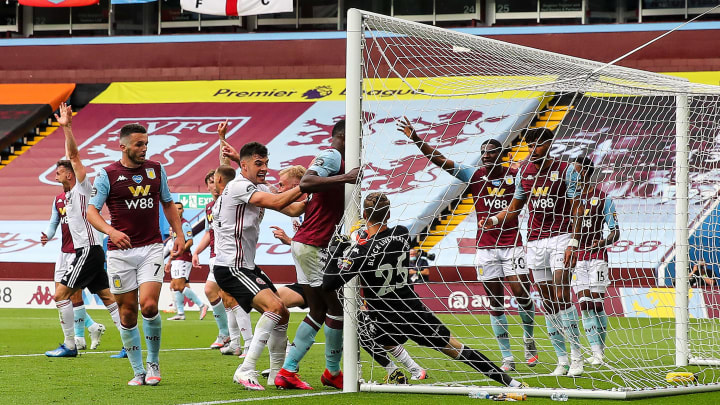Bournemouth Can Try Suing Hawk-Eye, But it Won't Get Them Very Far
By Charlie Stewart

The Premier League season ended in heartbreak for Eddie Howe's Bournemouth on Sunday, a 3-1 win over Everton not enough to extend their five-season stay in the top flight.
Despite their relegation, the Cherries can take pride in the fact that they managed to keep themselves afloat for so many seasons - an incredible achievement given that they were a League Two side in administration in 2008.
However. Bournemouth could have stayed up had Hawk-Eye not missed a goal in the post-restart match between Aston Villa and Sheffield United at Villa Park, which finished 0-0.
Villa finished one point ahead of Bournemouth – a point they may not have got if the Hawk-Eye goalline technology system had worked – and the Cherries are now considering legal options. Will they get any joy from that?
Well...no, not really. Here's why.
There's No Guarantee That Sheffield United Would've Won the Game
The argument is that if the goal had stood, Sheffield United would have won the game 1-0. It's not as simple as that. Goals change games. The incident occurred in the 42nd minute. Aston Villa weren't exactly going to just sit there for the entire second half and think "hmm...yeah, we'll take a 1-0 defeat". They'd have set up completely differently in search of an equaliser.
Would Sheffield United have won the game if the goal had stood? Probably, given that they're, y'know, better than Villa. But that's not really the point.
The game may have finished 0-1. It may have finished 0-3. It may have finished 1-1, 2-1, 7-8, 10-10. We don't know. If football was that easy to predict, then we'd all be millionaires.
It's No Different to Any Other Poor Decision
Ultimately, Sheffield United scored a goal that should have counted, but didn't. That's happened to every relegated team since the beginning of time. Aston Villa fans have pointed to the last-minute equaliser they had (arguably) unfairly ruled out against Crystal Palace. How is that any different?
To many, the difference is that this was a technological error, as opposed to a human error. Well, about that...
It's Still a Human Error
It's time to get technical.
Rule C.8. in the PL Handbook states that:
"Goal Line Technology shall be utilised at League Matches (save that, for the avoidance of doubt, a League Match shall proceed even if Goal Line Technology is unavailable for part or all of it). The referee's decision as to whether a goal has been scored shall be final."
Similarly, Rule A.1.81. says that GLT exists "for the purpose of assisting the referee".
Basically, it was still Michael Oliver's call. Hawk-Eye didn't make the decision. If Oliver or the VAR officials were confident enough that the ball had crossed the line, then they could have given the goal.
Hawk-Eye Isn't Infallible
For those who don't know, here's how GLT works. There are seven cameras pointed at the goal, which track the ball from different angles to determine its location. It is believed that Hawk-Eye is accurate within 3.6mm.
However, to determine its location, at least 25% of the ball needs to be visible to the cameras, meaning that obstructions could cause the technology to fail. This was known prior to the Premier League's introduction of Hawk-Eye.
Stayed pretty quiet on the 'Bournemouth legal action' nonsense but I suspect they already know it would be pointless.
— Supersized (@SupersizedAVFC) July 27, 2020
Premier League clubs signed off on Hawkeye over Goalref in 2012 knowing the vulnerability. Not sure you can then sue when it happens. ?♂️#AVFC #UTV pic.twitter.com/3hXdf7dLMC
In this instance, Aston Villa goalkeeper Orjan Nyland had the ball pressed up against his chest, with both arms wrapped around it, with striker Keinan Davies standing right in front of him, several other players in the general vicinity, and a goalpost right by his side. Sometimes you get unlucky.
Bournemouth Simply Weren't Good Enough
The Hawkeye incident isn’t why we’ve gone down. Losing to all four of the other bottom 5 in consecutive weeks after Xmas and the horror shows vs Palace, Toon and Saints are why we’ve gone. Where was this performance 9 games ago?! #afcb
— Ryan K (@Kingers_19) July 26, 2020
Over a 38-game season, you finish where you deserve to finish. Simple as that, really.
Bournemouth lost 22 games over the course of the season, and picked up just 34 points. They went on a nine-game run stretching from February through to July which saw them accumulate just two points, including heavy defeats against Burnley and Newcastle. Their poor performances throughout the season are what sent them down, not a technological fault in a game that they weren't involved in.
The Hawk-Eye incident provides a convenient scapegoat, but the fact of the matter is that they weren't good enough.